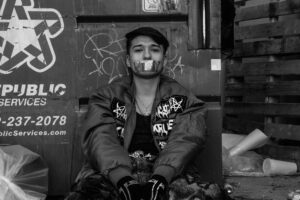When someone is addicted to cocaine, it can take over nearly every part of their life. This doesn’t just affect their physical and mental health; it also strains their relationships with the people around them. If someone you care about is struggling with cocaine addiction, it can be tough to know how to help — especially if they’ve become distant or secretive. Getting treatment is a critical first step toward a healthier life and mending those relationships.
Your support can make a real difference. Recognizing the signs of cocaine addiction and knowing how to approach them may be the first steps in helping them find recovery. In this post, you’ll learn how to spot the signs of cocaine addiction and ways to support your loved one on their path to a sustainable addiction recovery.
Signs of Cocaine Abuse
If someone is addicted to cocaine, their behavior often changes in noticeable ways. Friends and family are usually the first to pick up on these signs. While this list is by no means exhaustive, some of the common signs someone is addicted to cocaine may include:
Sudden Mood Swings
Cocaine can cause intense mood changes, leading to unpredictable behavior. One moment, a person might seem energetic or overly cheerful, and the next, they might be irritable or agitated. If you notice a loved one having extreme mood shifts without a clear reason, it could be a sign they’re using a substance like cocaine. Pay attention to these changes, especially if they happen frequently and seem out of character.
Constant Sniffling or Runny Nose
Cocaine is often inhaled, which can cause chronic sniffling or a runny nose. If someone frequently has these symptoms without being sick or having allergies, it might be worth noting. Look for patterns over time — if they constantly have nasal issues, it could point to frequent cocaine use.
Dilated Pupils
One of the more noticeable physical signs of cocaine use is consistently dilated pupils. Cocaine affects the central nervous system, causing the pupils to remain enlarged. If you often see someone with unusually large pupils, especially in well-lit areas, this could be an indicator of drug use.
Extreme Energy Changes
Cocaine is a stimulant, which can lead to sudden bursts of energy followed by fatigue. Someone using cocaine might seem full of energy and then crash, appearing drained or sluggish. If you notice that a person has sudden highs and lows in energy that don’t match their usual routine, it might be a sign of cocaine use.
Difficulty Keeping Up with Work or School
Struggling to maintain a regular schedule or meet commitments can be a sign of addiction. Cocaine use often disrupts a person’s ability to focus or stay organized. If someone starts missing work or school regularly, falling behind, or letting responsibilities slip, it could be due to the effects of cocaine on their daily routine.
Financial Problems Without Clear Reasons
Addiction can be costly, and cocaine use is often linked to sudden financial issues. If someone who typically manages their finances well starts having money problems or borrowing frequently, this may be a red flag. Watch for signs like unpaid bills, selling belongings, or frequent requests for loans.
Withdrawing from Friends and Family
Someone struggling with addiction may start isolating themselves from loved ones. If a person spends less time with family or friends, it may be due to a desire to hide their behavior or spend time using cocaine. This distancing can be subtle, but over time, you might notice they’re not as present or involved as they once were.
Secretive or Suspicious Behavior
Acting secretively is another common sign of cocaine use. A person may become more private, defensive, or anxious about their activities, who they’re with, or where they’re going. If you notice they’re unusually guarded or secretive, it could indicate they’re hiding something, like drug use.
Paranoia or Anxiety
Cocaine can heighten feelings of paranoia and anxiety, even when a person isn’t actively using it. If someone seems overly suspicious, nervous, or constantly worried, it could be an effect of cocaine use. This is especially concerning if these feelings seem irrational or out of character for them.
Decline in Performance at School or Work
Drug use can seriously impact a person’s ability to concentrate, leading to poor performance. If someone who usually does well starts performing poorly, missing deadlines, or not showing up, it may be due to cocaine’s effects on their motivation and focus.
How to Help Someone with a Cocaine Addiction
Helping someone with a cocaine addiction takes time, understanding, and a commitment to encouraging positive steps. By being there for them, speaking openly, and promoting healthy choices, you and your family can play a meaningful role in the recovery journey.
Some things to keep in mind as you do this include:
Tell Them Your Concerns
Even though addiction changes the way someone’s brain works, it doesn’t erase their care for loved ones. Your support and concern matter to them, even if they don’t show it. When talking about your worries, be open and honest, explaining how their behavior affects you and why you’re concerned. Showing that you genuinely care about their well-being can be the nudge they need to take the first step toward help.
Educate Yourself
Learning about cocaine addiction can help you understand what they’re experiencing and how addiction impacts behavior. Understanding the science behind addiction may help you approach conversations with more empathy and reduce the stigma they might feel. With the right information, you’ll also be better equipped to offer informed support.
Encourage Open Communication
Let them know they can talk to you about what they’re going through without fear of judgment. Addiction can be isolating, so offering a safe space for them to share their feelings can be comforting. Encourage them to talk openly about their struggles and listen actively without interrupting or immediately offering solutions.
Help Them Find Professional Help
While your support is important, a person with cocaine addiction also needs professional care to overcome dependence. A skilled therapist can help them understand their addiction and develop coping strategies for recovery. Detoxing at home can be dangerous and may lead to relapse, so encourage them to seek out a treatment center, addiction specialist, or support group that offers the structure and guidance they need. You might even offer to help them look into treatment options or accompany them to appointments.
Be Patient with Their Progress
Recovery is a journey, and setbacks are common. It’s essential to remain patient and continue to offer support, even if they experience challenges along the way. Celebrate their small victories and encourage them to keep moving forward, while reminding them that professional help is available.
Take Care of Yourself, Too
Supporting someone with an addiction can be emotionally draining. Make sure you’re looking after your own well-being by setting boundaries, seeking support from friends or a counselor, and taking time for self-care. Helping someone through addiction is challenging, so staying healthy and supported yourself will allow you to be a better source of help.
What Not to Do When Helping Someone with Cocaine Addiction
Supporting someone with a cocaine addiction means knowing both how to help and understanding what can be counterproductive. Certain actions, even if well-intended, can end up making recovery harder. Here are some things to avoid:
Don’t Act Judgmentally
Addiction is complicated, and many people battling it are painfully aware of the harm it causes to themselves and their relationships. They may want to quit but find themselves unable to do so. Coming across as judgmental or attacking them for their behavior can push them further away and make them more resistant to help. Instead, approach with understanding and compassion, focusing on encouraging steps toward recovery without adding to their guilt or shame.
Don’t Enable Addictive Behavior
It can be tempting to allow someone to continue using cocaine if they reassure you that they’re in control or if you want to avoid conflict. However, enabling them in any way can make it harder for them to quit in the long run. Avoid actions like lending money, making excuses for their behavior, or covering up their actions. Instead, set clear boundaries and communicate that while you’re there to support them, you can’t condone behavior that harms them.
Don’t Try to Control Their Recovery
Recovery is a personal journey, and while it’s natural to want to take charge and “fix” things, trying to control their actions can backfire. Forcing them to seek help, setting ultimatums, or pushing too hard may cause them to feel defensive or resist getting the help they need. Instead, offer support, encourage them to consider treatment options, and let them take steps at their own pace.
Treatment Options for Cocaine Addiction
If you or someone you love is struggling with cocaine addiction, treatment options are available. Treatment plans should be tailored to meet the individual’s needs. They may include a combination of therapies such as cognitive behavioral therapy (CBT), individual counseling, family counseling, group support, and more.
In addition to these therapies, medications may also be used to reduce cravings and manage withdrawal symptoms. Some programs you can expect in a cocaine addiction treatment center include:
- A comprehensive evaluation of your individual needs
- Detoxification to reduce withdrawal symptoms and cravings
- Behavioral therapies such as CBT, motivational interviewing, and dialectical behavior therapy (DBT)
- Group counseling sessions and psychotherapy
- Family counseling to address issues around the addiction
- Nutritional support
- Creative therapy activities
- Education and relapse prevention
- Aftercare support to ensure long-term recovery success
Get Support for Cocaine Addiction Today
At Northpoint Colorado, we understand that addiction is a complex medical condition and that every individual’s needs are unique. Our team of professionals is dedicated to providing evidence-based treatment tailored to each person’s needs.
We’re here for you and will work with you and your family to ensure a successful recovery for your loved one. Contact us online or give us a call at 888.294.6120 for more information about our cocaine treatment programs.




